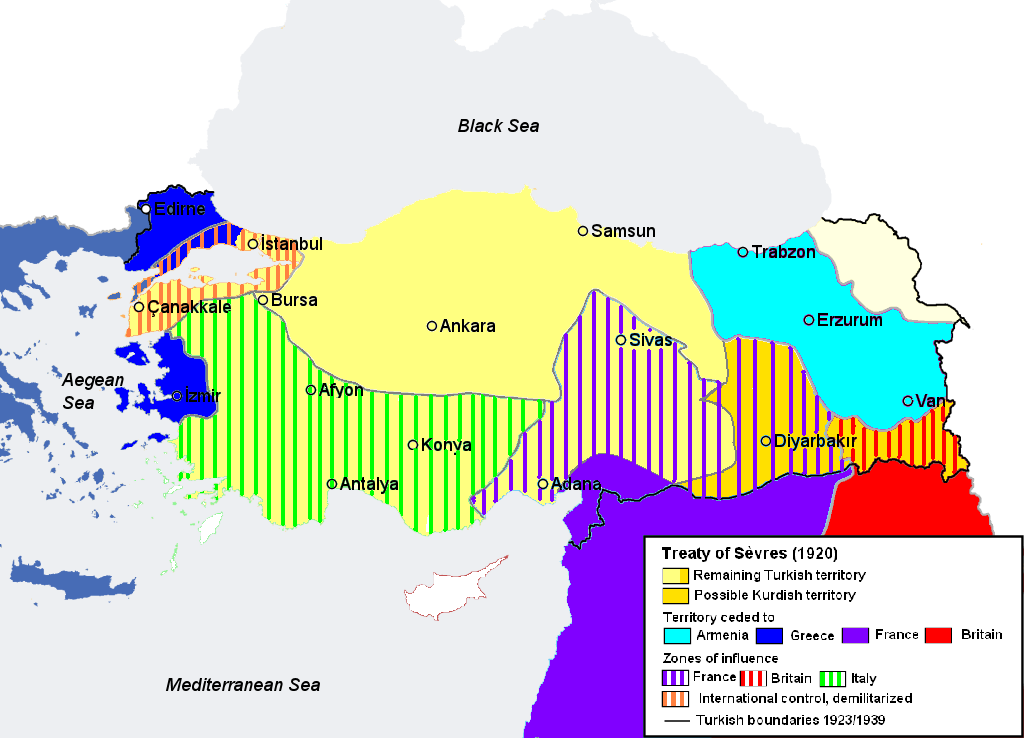The Ottoman Empire lost the First World War and was forced to sign the Treaty of Sèvres which sanctioned the partition of the empire. The treaty contained strong punitive measures, ironically, also because the Ottoman Empire perfomed better than expected and. In fact it gained a strong victory at the Battle of Gallipoli. So it was in part a measure of revenge.
The treaty was never put in pratice because the Turkish nationalist movement, led by Ataturk, won the Turkish War of Independence against the western proxies (mainly Greece) and also what remained of the Ottoman Empire. Instead it was signed the Treaty of Lausanne which said that the western powers would have kept all the rest of the Ottoman Empire land but Turkey would have kept all Turkish lands. So, nothing would have gone to Greece, Armenia or the Kurds. The losers were obviously not happy, and especially the Kurds which didn'tdid not have any land elsewhere.
Point two: the Turks are surrounded by enemies. And also Point three: Turkey is not simply repressing the Kurds, Turkish and Kurdish people are continuing a conflict started by the fall of the Ottoman Empire.
Multiethnic empires didn'tdid not need to have a uniform culture, because only the king and/or nobility mattered, people had no power. But in modern countries they matter, political and personal identities are important, even in multinational states. Kurdish identity was competing with the Turkish identity and as such was an obstacle to become a modern country. This answers the first question: the Ottoman Empire did not care about their people, while Turkey is their people.
Point four: a common identity is a need for a modern nation.
It should also be noted that while Turkey attempted to imitate France, the strong secularization was very controversial and it still is. This and other things has led to numerousmany periods of martial law, Coup d'état and the like. Again poltiical turmoil is not surprising in modernizations, it happened everywhere. But the fact this has occured in recent times helps to understand why Turkey might still be in the very nationalistic phase of modernity.
The answer to the question why Thethe Turks did not want the lose part of their territory by granting independence to the Kurds is in part is self-evident, in. In the sense that nobody want to be weak, and in part connected to point 1 and 2. They would not only lose territory but they feel they would gain a new enemy.
You might think that this answers the question of why they acted this way in the past, but not today, because this is a different time and many. Many modern countries have stopped repressing minorities. To understand this, you have to remember that history matters to politics and identity. Everybody else in the region is still quite aggressive, for instance see the bizarre Macedonian naming dispute started by Greece.
The change of attitude toward minorities works both ways, the Kurds don'tdo not need Kurdistan to survive and mantaining their own identity. This lead to a complex game: let's say you would give Kurds independence, if the alternative is a civil war, but if you just wait a few years there might not be a civil war. So what do you do? A little repression, to lessen the Kurdish identity, but not too much, to avoid a civil war? It's hard for both government and people to decide what to do.
